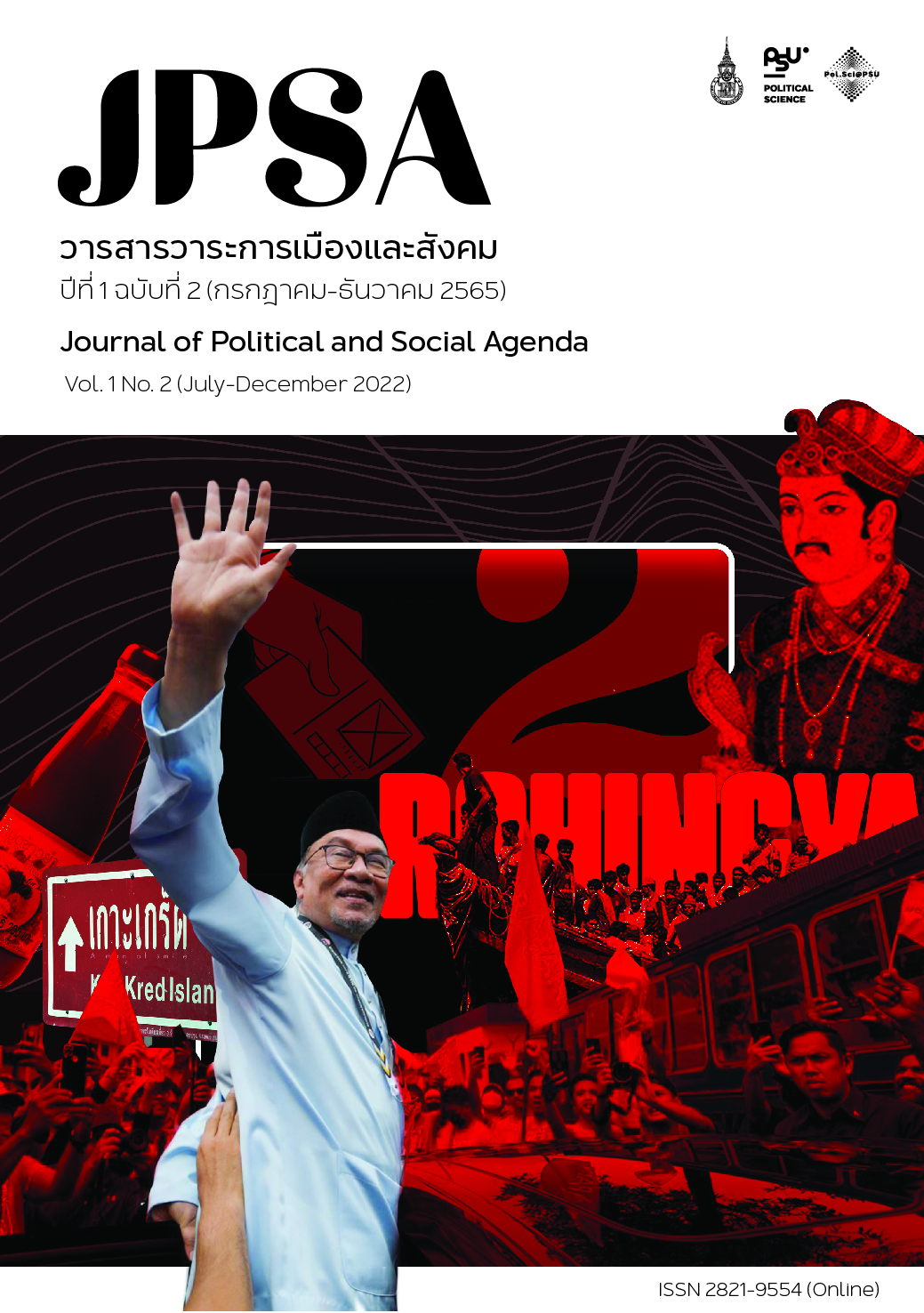กษัตริย์อักบัรมหาราช โลกทัศน์การอยู่ร่วมกันในพหุสังคม
Main Article Content
บทคัดย่อ
บทความวิจัยชิ้นนี้ศึกษาอัตชีวประวัติของท่านกษัตริย์อักบัรมหาราช (1542-1605) ซึ่งเป็นกษัตริย์ของอาณาจักรโมกุลที่ปกครองสังคมพหุความเชื่อ วัฒนธรรม และหลักคำสอนศาสนา โดยมีเป้าหมายดังนี้ (1) ทำความเข้าใจชีวิตและวิถีการปฏิบัติของท่านอักบัร (2) ทำความเข้าใจมุมมองและโลกทัศน์ในการอยู่ร่วมกันท่ามกลางพหุสังคมของท่านอักบัร การศึกษาครั้งนี้มีผู้ให้ข้อมูลสำคัญคือ นักวิชาการชาวไทยและชาวอินเดียที่มีความเชี่ยวชาญด้านประวัติศาสตร์ การเมือง การปกครอง สังคม วัฒนธรรม และแนวคิดพหุวัฒนธรรม จำนวน 11 ท่าน ด้วยการเก็บข้อมูลเชิงเอกสาร สัมภาษณ์เชิงลึก และสังเกตการณ์แบบมีส่วนร่วม โดยมีเครื่องมือที่ใช้ในการเก็บข้อมูลคือ แบบบันทึกภาคสนาม ผู้วิจัยได้จำแนกและจัดระบบข้อมูลออกเป็นหมวดหมู่ แล้ววิเคราะห์สรุปอุปนัยเพื่อหาบทสรุปร่วมกัน โดยเปรียบเทียบเหตุการณ์กับเหตุการณ์อื่นเพื่อหาความเหมือนและความต่างที่เกิดขึ้น แล้วนำมาวิเคราะห์ให้เห็นด้วยการพรรณนาและอธิบาย
ผลการวิจัยพบว่า 1) ชีวิตและการปฏิบัติของท่านอักบัรได้นำเสนอแนวคิดการอยู่ร่วมกันท่ามกลางความหลากหลาย 2) โลกทัศน์ในการอยู่ร่วมกันท่ามกลางพหุสังคมของท่านอักบัรนั้นมุ่งเน้นการสร้างสันติภาพที่ส่งเสริมวัฒนธรรมสันติภาพ เช่น การก่อตั้ง “อิบาดะฮฺ กานา” เพื่อเป็นแหล่งชุมนุมปวงปราชญ์หลากความเชื่อ และการขับเคลื่อนนโยบาย “ดีน อีลาฮี” เพื่อหลอมรวมทุกคนให้เป็นหนึ่งเดียว แม้จะมีการวิพากษ์และมุมมองที่แตกต่างจากปวงปราชญ์ทั้งหมดเหล่านี้ถือเป็นพื้นฐานในการอยู่ร่วมกันในพหุสังคม
ผู้วิจัยมีข้อข้อเสนอแนะว่า ผู้ปกครอง นักบริหาร ผู้กำหนดนโยบาย รวมทั้งสถาบันการศึกษา ครูบาอาจารย์ สามารถนำมุมมองและโลกทัศน์การอยู่ร่วมกันท่ามกลางความหลากหลายของท่านอักบัรไปปรับใช้ให้สอดคล้องกับบริบทของสังคมเพื่อหนุนเสริมสันติภาพในสังคม
Article Details

อนุญาตภายใต้เงื่อนไข Creative Commons Attribution-NonCommercial-NoDerivatives 4.0 International License.
บทความที่ได้รับการตีพิมพ์ในวารสารออนไลน์เล่มนี้เป็นลิขสิทธิ์ของวารสารวาระการเมืองและสังคม ความคิดเห็นและข้อถกเถียงที่ปรากฏในบทความเป็นความรับผิดชอบของผู้เขียน บรรณาธิการวารสารฯ ไม่มีความเกี่ยวข้องใด ๆ กับความคิดเห็นของผู้เขียนและไม่จำเป็นต้องเห็นด้วยกับความคิดเห็นของผู้เขียน
เอกสารอ้างอิง
ภาษาไทย
Basham, A.L. (2559). กาญจนี ละอองศรีและคณะ (แปล). The Wonder that was India (อินเดียมหัศจรรย์ ศึกษาประวัติศาสตร์และวัฒนธรรมของอนุทวีปอินเดียก่อนการเข้ามาของมุสลิม). กรุงเทพฯ: มูลนิธิโตโยต้าประเทศไทยและมูลนิธิโครงการตำราสังคมศาสตร์และมนุษยศาสตร์
กรุณา กุศลาสัยและเรืองอุไร กุศลาสัย. (2543). วัฒนธรรมสัมพันธ์: ไทย-อินเดีย. กรุงเทพฯ: สำนักพิมพ์ศยาม
อับดุรเราะฮหมาน มูเก็ม. (2565). ปัจจัยการดำรงอยู่ของสังคมพหุวัฒนธรรมอินเดีย. วารสารสิทธิและสันติศึกษา 8 (1): 26-53. https://so03.tci-thaijo.org/index.php/HRPS/article/view/259435
ภาษาอังกฤษ
Brahma, Daimalu. (2020). Evolution of Akbar’s Religious Policy. High Technology Letters 26 (7): 1177-1187.
Husain, S. Abid (1978). The National Culture of India. New Delhi: National Book Trust.
Iftikhar, Rukshsana. (2016). Genesis of Indian Culture: Akbar Quest for Unity in a Traditional Society. International Journal of Social Science and Humanity 6 (4): 293-296.
Ikram, S. M. Ainslie T. Embree. Ed. (1964). Muslim Civilization in India. New York: Columbia University Press.
Mayor, Federico. (2011). The Development of Culture of Peace and Non-Violence (1988-2010). Barcelona: The Foundation for a Culture of Peace.
Monserrate, S.J. (1922). J. S. Hoyland, tr. The Commentary of father Monserrate on his Journey to the Court of Akbar. London: Oxford University Press.
Muzaffar, Chandra. (2001). “Politics, Religious Resurgence and Conflict in Asia.” In Interfaith Conference on the Culture of Peace: Celebrating A.M.A.N.’s Ten Years of Relevance in International Solidarity Networking and Peace-Work. Mucha-Shim Arquiza and M. Abdus Sabur. Eds., Bangkok: Asian Muslim Action Network. 249-272.
S.J. Pierre Du Jarric. (1926). Akbar and the Jesuits. An Account of the Jesuit Missions to the Court of Akbar. New York: Harper & Brothers.
Sharma, Sri Ram. (1972). The Religious Policy of the Mughal Emperors. Bombay: Asia Publishing House.
Smith, Vincent A. (1917). Akbar the Great Mogul 1542-1605. Oxford: The Clarendon Press.
Srivastava, Ashirbadi Lal. (1965). A Short History of Akbar the Great (1542-1605). Agra: Agra College.
Zakaria, Anam. (2015). The Footprints of Partition: Narratives of Four Generations of Pakistanis and Indians. New Delhi: Harper Collins Publishers India.


